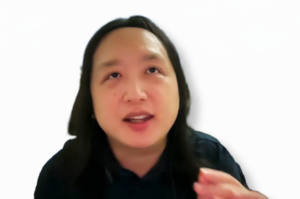
Ep 169 | Audrey Tang
Audrey Tang – Digital Democracy: Moving Beyond Big Tech to Save Open Societies
Summary
As the world is increasingly shaped by the dominance of ‘Big Tech’ – including the race for Artificial Intelligence – the outsized impact on our democratic and information systems has left many with fears and confusion about the path forward. But what if we could use technology as a tool that helps preserve the values of democracy and increases civic engagement, rather than eroding them? Furthermore, what sorts of people, projects, and policies are already paving the way?
Today Nate is joined by Taiwanese Digital Ambassador at large, Audrey Tang, to explore real-world examples of how technology is being leveraged globally to address – and in some cases reverse – critical societal challenges, such as polarization, misinformation, and the erosion of trust in governments and institutions.Tang emphasizes the importance of digital democracy, civic engagement, and incentivizing care in our policy making decisions to create a better experience and world for all humans.
Is it possible to use social media as a tool that unifies citizens across polarized societies? How could technology be used to amplify the voices of citizens and influence policy making with human and planetary well-being in mind? And finally, even as technological corporations continue to consolidate power, what options are available to individuals who want to engage with technology in new and empowering ways?
About Audrey Tang
Audrey Tang is Taiwan’s Cyber Ambassador-at-large and was the first Digital Minister of Taiwan. Audrey is celebrated for their pioneering efforts in digital freedom. Named one of TIME’s “100 Most Influential People in AI” in 2023, Tang was instrumental in shaping Taiwan’s internationally acclaimed COVID-19 response and in safeguarding the 2024 presidential and legislative elections from foreign cyber interference. Audrey is now focused on broadening their vision of Plurality — technology for collaborative diversity — to inspire global audiences.
In French, we have a motto that says that a simple drawing is often better than a long explanation. Jean-Marc Jancovici Carbone 4 President
That’s very understandable because with left atmosphere thinking, one of the problems is that you see everything as a series of problems that must have solutions. Iain McGilchrist Neuroscientist and Philosopher
We can’t have hundreds and hundreds of real relationships that are healthy because that requires time and effort and full attention and awareness of being in real relationship and conversation with the other human. Nate Hagens Director of ISEOF
This is the crux of the whole problem. Individual parts of nature are more valuable than the biocomplexity of nature. Thomas Crowther Founder Restor
Show Notes & Links to Learn More
Download transcript00:00 – Audrey Tang
03:10 – Ministry of Digital Affairs of Taiwan
03:34 – Sunflower Movement, Occupy Parliament
04:24 – Chinese data monitoring practices
06:02 – Reverse Mentorship in Taiwan
06:28 – vTaiwan work on Uber, Pandemic Management in Taiwan, and Generative AI
06:41 – Taiwan government approval rating
07:48 – Postmodernism
11:20 – National Participation Platform
16:36 – Bowling Green, Kentucky
17:11 – Citizens’ Assembly
17:42 – Deliberative Democracy Lab, Research on Citizens Assembly
19:50 – Conversation Networks Paper
20:19 – Assistive Intelligence
21:56 – g0v.tw (Gov Zero), Polis
25:40 – Nora Bateson, TGS Episode, Warm Data Labs
28:07 – Taiwan prioritizing civic competencies in education
29:14 – Taiwan standardized test Scores
29:33 – Taiwan least polarized among OECD equivalents
30:19 – Pre-bunking
31:33 – SARS
32:13 – Shiba-inu Mask Campaign
38:37 – Prosocial Media Paper
40:23 – Project Liberty Institute, plans to buy TikTok
41:55 – Linkedin algorithmic differences towards social cohesion
43:33 – Bluesky, Truth Social
46:34 – When Product Markets Become Collective Traps: The Case of Social Media
52:58 – Cybernetics etymology
58:45 – Tradition of citizen assemblies in Japan
59:53 – Citizen assemblies in Oregon
1:00:32 – Jigsaw sensemaking
1:02:02 – Cortico
1:04:13 – How to turn on gray scale
1:06:57 – Tristan Harris, TGS Episode
1:09:44 – Martial Law
1:14:44 – Dynamic facilitation, Focused conversation method, Group facilitation techniques
1:17:18 – Active Listening
1:17:55 – Daniel Schmachtenberger, TGS Episodes
1:19:25 – Taiwanese students changing school start times, Menstruation museum
1:20:05 – People, Power, Change: Organizing for Democratic Renewal
1:21:26 – Good Enough Ancestor
1:22:26 – Leonard Cohen







